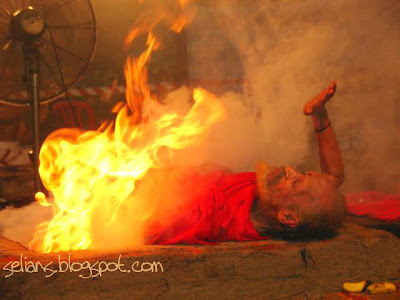M'sia suffers major blow in corruption index
In the ranking which was revealed today Malaysia plunged nine places from last year's 47th CPI ranking to 56th position.
At the same time, Malaysia's CPI index score plunged to the lowest in 15 years to 4.5. It previous worst scores below 5 were 4.8 in 2000 and 4.9 in 2002.
Malaysia has been continuously sliding down in the TI index since it best ever placing of 33 in 2002.
DAP parliamentarian leader Lim Kit Siang, in an immediate reaction, said while he had expected a poor result, he did not anticipate such a grave fall.
"This is a national shame and major blow for Najib's premiership," he said.
"I have no doubt that the mysterious death of DAP political aide Teoh Beng Hock on July 16 and the Malaysian Anti-Corruption Commission's role as Umno's catspaw to declare war on Pakatan Rakyat instead of declaring war on corruption were major factors for Malaysia's worst-ever TI CPI ranking and score," he said.
He questioned if Prime Minister Najib Abdul Razak will react to the embarrassing fall suffered by Malaysia.
The Berlin-based Transparency International is the global civil society organisation leading the fight against corruption.
TI-M backs Najib's initiatives
Meanwhile Transparency International Malaysia (T-IM) has acknowledged Malaysia's efforts to deal with corruption although the country's ranking on the corruption perception index (CPI) this year has declined.TI-M president Paul Low said Najib's moves to initiate reforms in some institutions, especially the judiciary, and the setting up of the Malaysian Anti-Corruption Commission, to make them more independent, transparent and accountable, was the way forward for the country.
He said this at a press conference to announce Malaysia's position in the Transparency International Corruption Perceptions Index 2009.
He said Transparency International Malaysia believed that the way forward for the country was to seriously combat corruption and to make government decisions and transactions more visible and transparent.
Low, however, suggested that the government should be more transparent in its procurement process by implementing "integrity agreement" with vendors to act as preventive measures to curb corruption.
He also said that Malaysia's decline in ranking in CPI 2009 of 0.6, from 5.1 in 2008 to 4.5 this year, "may be attributed to the perception of little progress in combating corruption, and lack of political will in implementing effective anti-corruption measures".
Examples giving rise to the concern were the Port Klang Free Zone (PKFZ) fiasco and the auditor-general's annual report highlighting extraordinary public procurement abuses, he said.
"However, there are positive signs. The PKFZ fiasco is being actively and vigorously investigated, police reports have been made and suits have been taken against certain parties, and corrective measures have been taken.
Singapore on the top tier
In announcing its latest CPI in Berlin today, TI said that no region of the world was immune to the perils of corruption.
"At a time when massive stimulus packages, fast-track disbursements of public funds and attempts to secure peace are being implemented around the world, it is essential to identify where corruption blocks good governance and accountability, in order to break its corrosive cycle" said Transparency International chairperson Huguette Labelle in a statement.
He added that most of the 180 countries included in the 2009 index scored below five on a scale from 0 (perceived to be highly corrupt) to 10 (perceived to have low levels of corruption) - Malaysia scored 4.5.
He also said that the CPI measured the perceived levels of public sector corruption in a given country and was a composite index, drawing on 13 different expert and business surveys.
The 2009 edition scored 180 countries, the same number as the 2008 CPI.
The 2009 had placed states that were scarred by war and ongoing conflict at the bottom of the index. These were Somalia, with a score of 1.1, Afghanistan at 1.3, Myanmar at 1.4 and Sudan tied with Iraq at 1.5.
Highest scorers in the 2009 CPI were New Zealand at 9.4, Denmark at 9.3, Singapore and Sweden tied at 9.2 and Switzerland at 9.0.
"These scores reflect political stability, long-established conflict of interest regulations and solid, functioning public institutions," said Labelle.
He added that overall results in the 2009 index were of great concern because corruption continued to lurk where opacity ruled, where institutions still needed strengthening and where governments had not implemented anti-corruption legal frameworks.
more news at : http://www.malaysiakini.com/news/117671
seals: Insult to ICAC?


Comments